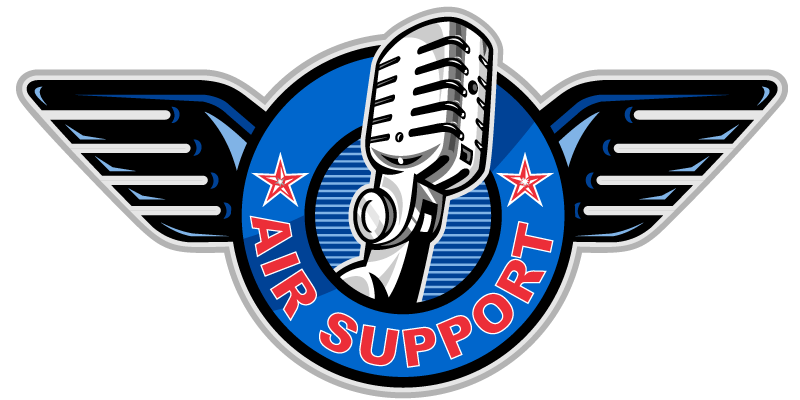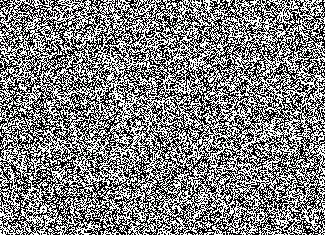White Noise
Thanks for checking out the very first "Radio Recon" blog at AirSupport.ca! I'll tackle a new topic every Wednesday. Be sure to check back weekly. This week, let's talk a bit about white noise.
White noise is a huge problem in most radio advertising. For some reason, advertisers have decided that their commercials are only good if they sound like well... a commercial. By this, I mean that they want it to sound like something they've already heard. BLECH!!! This a bad thing! The bottom line is, radio listeners (and people in general) have unconsciously spent their whole lives learning how to block out advertising. Nobody wants to be advertised to (or at.) We've all learned to tune out the white noise.
The biggest problem that most radio advertising campaigns have is that they are afraid to create their own sound. Too many business owners equate being different with being wrong. This is opposite to the truth. Sounding like a radio commercial is equal to being invisible (or inaudible.) The only way you can overcome a bad commercial, is by purchasing a lot of frequency in your campaign. You can then pound your boring image into the listeners head like a nail. I don't recommend this. Good advertising can cost a little more up front. But, it can save you money in advertising dollars. You'll need to play it less to have it heard more. And if you have the budget to have high frequency as well, a great commercial will make your brand grow exponentially.
You absolutely need to earn the listeners attention. Most business owners are guilty of getting too close to their companies & their advertising campaigns. Something strange happens when it's your advertisement. Suddenly you forget how a person listens to the radio. Nobody listens to radio commercials on purpose. I promise you that. Listeners would much rather listen to their favourite music & radio personalities. Nobody wants to hear about your futon sale. I don't care how big it is. But, that's how businesses think when they explore their radio campaigns. They think that the message will be heard from beginning to end. That's never the case. The key is to entice a radio listener to become an active listener. Using statements that they'd expect from advertising (white noise) in your message ensures that they will remain an inactive listener. That's why we have to trick them into listening. That's a huge topic that we'll tackle in many different articles in the future. For now, let's focus on what not to say.
That's actually pretty easy. We've all listened to thousands of hours of radio. So, we all have a very good idea of what a typical radio ad sounds like. Bad advertisers think of these as examples of things that work in radio. Good advertisers know that these are examples of things to avoid. Here's asmall list of some of the biggest clichés to avoid.
- Talking about service - NOBODY CARES! It's unfortunate but nobody cares about how good your service is in a your advertising. It's an enormous waving red flag that says "Don't listen to me. I'm a commercial." The biggest problem that comes from "service" is that it's been used in so many commercials that it is irrelevant. It may very well be true that your service is fantastic. It still doesn't matter when everybody else says the same thing. Service is something you prove when the customer enters your business. Not in your advertising.
- Long addresses, bad websites, & complicated phone numbers - More white noise. When you slap down tens of thousands of dollars for your advertising campaign, don't allow one precious second of your message to be eaten up by any of this gobbledegook. Remember again, radio listeners are not active. Even if you have the greatest message ever written, people will never be able to remember 1-800-555-9134. I don't care if you say it three times. And please don't say it three times. That will only eat up more valuable time that your advertisement could use to make an actual connection with the listener. The great thing we have now that past advertisers didn't, is the internet. You don't need to waste time with your phone number, address, or website. Your listeners will find this information in many different ways on their own. Spend more time making sure the listener actually cares about your business. If they do, they will find you. Nobody remembers "visit us at on 156th street & 67th avenue in South Boringsville" when they're speeding down the highway. The same goes for websites. Nobody will remember to visit www.mrgryllzbbqrestaurant.biz. Even if you explain not to type "mister" and that "grills" is spelled with a "Y" and a "Z." And especially not after "dot biz." If you have a simple website, use it. Otherwise, ask people to Google you. If you are interesting in your message, they will find you on their own.
- Price points - I know a lot of businesses believe their advertising is nothing without price points. This isn't true. Price points are amongst the worst examples of radio white noise. Nothing tips a listener off more to the fact that they're hearing an advertisement than "on sale for $99.99 for a limited time only!." We all know car dealerships are the worst for these. Some of them actually believe that they work well. I'd argue that the amount of money they spend on airing these commercials is what actually makes these campaigns work (hammering a nail into the listeners head.) You can advertise more smartly. This doesn't mean that price points are completely useless. Just don't laundry list them. Stick with one good deal. One good price and build an intelligent commercial around it. You may have a dozen more price points that are just as good. Don't use them. They become less effective with every number you throw out. Trust me. Stick with one. Build a story, an emotion, a joke...just build SOMETHING around it. Good advertising makes a personal connection with the listener. Leave the hammer in the garage.
- Talking about how much you care about your customers - No listener will ever believe you. It doesn't matter if it's true. No real human being will ever believe that a business cares about them. Certainly not after hearing your 30 second commercial. Take that phrase out of your advertising vocabulary.
- Cheesy Testimonials - We've all heard them, and we all know they're fake. Being fake in advertising today is death. Have you ever had a close friend tell you "I just had a fantastic experience at ABC supermarket. It's like they actually cared about me & my family. I didn't feel like just a number, you know? They greeted me with a smile & packed my feminine hygiene products with discretion!" No you haven't. And you never will. Kill your robots. They're a big tip off to tune out.
- Lasers, whooshes, and other stupid SFX - Not all white noise is verbal.
This list can go on endlessly. The bottom line is, be original in your advertising. Don't copy what anybody else does. And especially don't copy what everybody else does. Your business is special. You have real reasons why people will want to stop by. Explain that in a way that's interesting to them. Don't be the dull person at the dinner party that talks about themselves all night. Include your listener. Talk with them, not at them. We're not writing mission statements or addressing share holders. We're speaking with real human beings. Treat them that way. People want to be entertained. We want to be stimulated in new and interesting ways. We don't want to be advertised at. And through cultural evolution, unless we allow it, we won't be advertised at.
Listen to these two advertisements and decide which one speaks to you more.
The sad thing is, it would be a lot easier to convince a business owner to run the first commercial. It sounds like a radio commercial. It especially sounds like a car radio commercial. That's why it isn't any good though. Radio listeners are really good at tuning out ads that sound just like that. Also, of all the information that was thrown out, how much can you remember? How much did the cars cost? What brands were available. Where was the dealership? Web address? Phone number? I doubt anyone would have retained any of that if they listened on purpose. Therefore, the whole thing is an unmitigated disaster. It's easy to tune out, and none of the information lands. It's like if someone threw 5 balls at you and you tried to catch every single one. You'd end up dropping them all.
That's what makes the second commercial better. It has one point. The dealership is made up of real people. It's one real person, speaking the way one person would talk to another person. We still manage to get an address in there in a round about way. But, it's understood that the listener will be able to find the dealership in all the different ways that living in 2011 affords us. Since the ad isn't forcing numbers out, it has more time to be real. It has more time to deliver an effective message. What I'm saying is don't waste even one second of your precious time listing off anything that doesn't help you connect with your audience. White noise in your script, ends up as static on the radio.
If you're worried that your advertising is suffering, and you're not completely comfortable diagnosing the problem, feel free to send them my way. I'd be happy to give you some free advice. Just send them to adam@airsupport.ca.
Check out "Radio Recon" again next Wednesday! We'll be talking about redirect websites!

